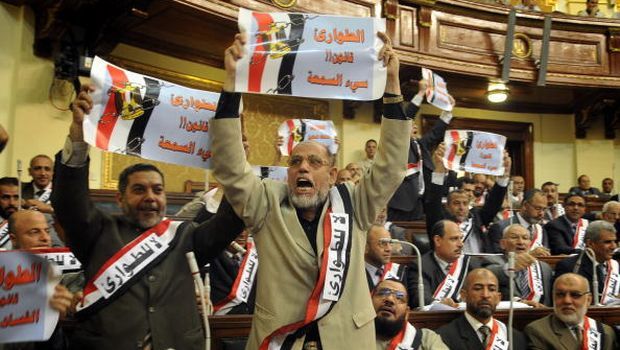 Today I proceed with discussing the topic of the new People’s Assembly and the hegemony the ruling National Democratic Party (NDP) holds over it. Whether this hegemony is the result of NDP superiority compared to the other political parties, or of a lopsided political map which the NDP has drawn and worked to put into effect, it is time to figure out an escape from this rigid political scene. Work has to be exerted to achieve a climate conducive to real political pluralism within which other political parties no longer play second fiddle to the NDP, but actively participate and compete.
Today I proceed with discussing the topic of the new People’s Assembly and the hegemony the ruling National Democratic Party (NDP) holds over it. Whether this hegemony is the result of NDP superiority compared to the other political parties, or of a lopsided political map which the NDP has drawn and worked to put into effect, it is time to figure out an escape from this rigid political scene. Work has to be exerted to achieve a climate conducive to real political pluralism within which other political parties no longer play second fiddle to the NDP, but actively participate and compete.
For a new political map
Youseef Sidhom
Opinion
00:12
Sunday ,19 December 2010

In an underestimation of public intelligence, some are sceptically asking what was the NDP required to do now that the other parties have failed to secure seats in the recent elections; should there be a quota of seats for the different parties? But such questions disregard where the real problem lies. The political map in Egypt has been carefully drawn out to secure supremacy of the NDP. Other parties can only spin in orbit around it with no chance of ever crowding it out of orbit. Any casual observer of the work of the Committee of Party Affairs throughout the last two decades cannot fail to observe that it rejected applications for the foundation of new parties with serious agendas by persons who carried political, intellectual and patriotic weight. At the same time, the committee approved applications by parties—currently in operation—the performances of which are feeble or trifling. The committee thus strongly contributed to the NDP hegemony over the political arena. A glimpse at the membership of the committee—a supposedly impartial, non-partisan body—explains the entire matter: its members are NDP leaders.
The political map of Egypt can only change by pumping new, invigorating blood in current parties and by initiating new parties which introduce new thought, new figures, and new agendas. This, in turn, can only be achieved through removing all restrictions in the path of the formation of new parties. The committee of party affairs may be abolished altogether and new parties may be formed upon official notice, or a new committee may be formed the members of which have no partisan affiliation. If this materialises Egypt would, in the space of a decade, acquire a healthy political vitality the diversity of which would drive Egyptians in droves to the polls. The focus of voters would then move from the current family or clan loyalty to the candidate who can pledge to work for a better quality of life. In this respect, it has to be admitted that a large portion of the sweeping victory by the NDP was on account of fielding candidates who belonged to the powerful families or clans in specific constituencies. Where there were more than one such clan in a single constituency the NDP chose to take no risks and fielded candidates from the different clans to run against one another; in all cases the NDP emerged victorious.
The electoral system must also change so that a slate system would replace the current individual system in which the individual supersedes the party. The recent elections revealed very clearly how party programmes and agendas lost to the sway of the personal promises of services or bribes offered by the candidates who more often than not belonged to the powerful families in the constituencies.
A slate system carries the potential of treating a large portion of our electoral woes. It places the party ahead of the individual candidate, it offers party programmes as a political alternative to clan authority, and allows diversified party representation with balanced opposition in legislative councils. It is self-evident that such a political scene makes it next to impossible for candidates to offer electoral bribes, and limits the fielding of executive ministers unless they abandon office. Candidates would all enjoy equal electoral opportunity and there would be no conflict between the legislative and executive roles of ministers.
The National Council for Human Rights, a State-affiliated council famous for respect of rights and impartiality, and for its bold candid reports, issued a report last week in which it declared the council was studying the recent elections and was finalising its official report on them. “Our final report,” it said, “will include a number of proposals and recommendations that touch on the adequacy of the individual electoral system and its ability to secure transparency and broaden the electoral base.”



